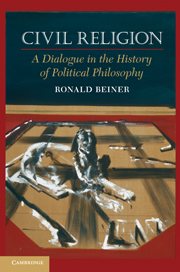Book contents
- Frontmatter
- Contents
- Preface and Acknowledgments
- Introduction
- Part I Machiavelli, Hobbes, Rousseau
- Part II Responses to (and Partial Incorporations of) Civil Religion within the Liberal Tradition
- 9 Baruch Spinoza
- 10 Philosophy and Piety
- 11 Spinoza's Interpretation of the Commonwealth of the Hebrews, and Why Civil Religion Is a Continuing Presence in His Version of Liberalism
- 12 John Locke
- 13 “The Gods of the Philosophers” I
- 14 Bayle's Republic of Atheists
- 15 Montesquieu's Pluralized Civil Religion
- 16 The Straussian Rejection of the Enlightenment as Applied to Bayle and Montesquieu
- 17 “The Gods of the Philosophers” II
- 18 Hume as a Successor to Bayle
- 19 Adam Smith's Sequel to Hume (and Hobbes)
- 20 Christianity as a Civil Religion
- 21 John Stuart Mill's Project to Turn Atheism into a Religion
- 22 Mill's Critics
- 23 John Rawls's Genealogy of Liberalism
- 24 Prosaic Liberalism
- Part III Theocratic Responses to Liberalism
- Part IV Postmodern “Theism”
- Conclusion
- Index
- References
22 - Mill's Critics
Published online by Cambridge University Press: 05 June 2012
- Frontmatter
- Contents
- Preface and Acknowledgments
- Introduction
- Part I Machiavelli, Hobbes, Rousseau
- Part II Responses to (and Partial Incorporations of) Civil Religion within the Liberal Tradition
- 9 Baruch Spinoza
- 10 Philosophy and Piety
- 11 Spinoza's Interpretation of the Commonwealth of the Hebrews, and Why Civil Religion Is a Continuing Presence in His Version of Liberalism
- 12 John Locke
- 13 “The Gods of the Philosophers” I
- 14 Bayle's Republic of Atheists
- 15 Montesquieu's Pluralized Civil Religion
- 16 The Straussian Rejection of the Enlightenment as Applied to Bayle and Montesquieu
- 17 “The Gods of the Philosophers” II
- 18 Hume as a Successor to Bayle
- 19 Adam Smith's Sequel to Hume (and Hobbes)
- 20 Christianity as a Civil Religion
- 21 John Stuart Mill's Project to Turn Atheism into a Religion
- 22 Mill's Critics
- 23 John Rawls's Genealogy of Liberalism
- 24 Prosaic Liberalism
- Part III Theocratic Responses to Liberalism
- Part IV Postmodern “Theism”
- Conclusion
- Index
- References
Summary
When priests, of whatever creed, claim to hold the keys of heaven and hell and to work invisible miracles, it will practically become necessary for many purposes to decide whether they really are the representatives of God upon earth, or whether consciously or not they are impostors, for there is no way of avoiding the question.
– James Fitzjames StephenWe are brought back, then, to the question, Are these doctrines true?
– James Fitzjames StephenMill died in 1873; the Three Essays on Religion was published the following year. This same period (the end of 1872 to the beginning of 1875) saw the publication, from two opposing sides, of stringent intellectual challenges to Mill's views about religion. It may help to clarify Mill's attempt to fashion a compromise between religion and humanism through a discussion of how Mill's work gets caught in the crossfire between a tough-minded liberal humanist like John Morley and an equally tough-minded political defender of religion like James Fitzjames Stephen.
Let us start with John Morley's sharp and witty commentary on the Three Essays. Morley was an intellectual and later a prominent politician who was personally close to Mill, who clearly looked up to Mill as a true exemplar of both intellectual and political life at their best, and who owed his own loss of faith, apparently, “in part at least [to] having read On Liberty.” In the light of Morley's self-conception as “a follower” of Mill, there is no question that the essays on religion (especially the third) were a deep disappointment. It would perhaps be overstating the point to say that Morley received the Three Essays as an act of intellectual betrayal, but his response to the essays clearly leans in that direction.
- Type
- Chapter
- Information
- Civil ReligionA Dialogue in the History of Political Philosophy, pp. 268 - 282Publisher: Cambridge University PressPrint publication year: 2010



